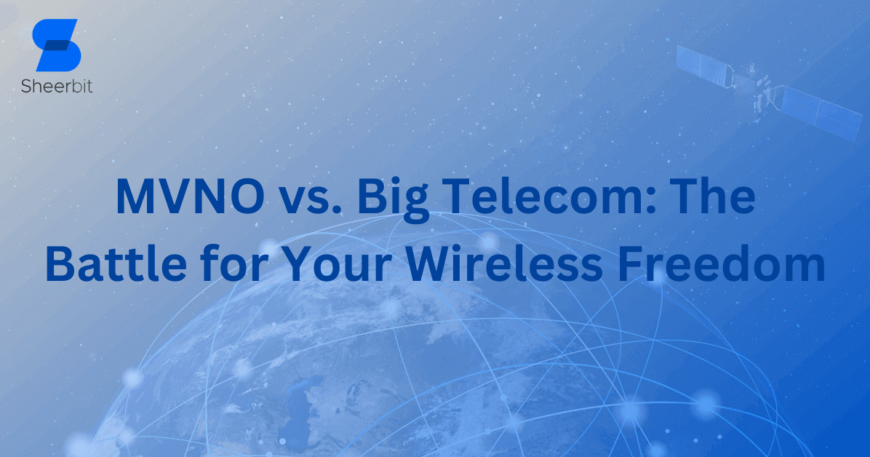Wireless communication has become a crucial aspect of our everyday lives in today’s hyper-connected environment. A dependable and cheap wireless service is essential for everything from getting in touch with loved ones to conducting business on the fly. However, with large telecom corporations controlling the industry for years, customers have had few options for cellular carriers. Mobile Virtual Network Operators (MVNOs) are a potential disruptor. We’ll discuss how the fight for your cellular freedom between MVNOs and big telecom is altering the landscape of the telecoms sector in this blog article.
Understanding the Wireless Landscape
It’s crucial to comprehend the significant stakeholders in the cellular sector before delving into the MVNO vs. enormous telco clash.
Big Telecom:
These are the telecom giants, such as AT&T, Verizon, T-Mobile, and Sprint (which has since merged with T-Mobile). They are generally called Mobile Network Operators (MNOs), and they control and manage their wireless networks. They have significant customer and infrastructural bases.

MVNOs (Mobile Virtual Network Operators):
While MVNOs do not control their cellular infrastructure, the opposite is true. Instead, they rent access to the network from MNOs. MVNOs put their attention on offering cellular services and customer support without having to invest heavily in infrastructure. They can provide affordable prices and distinctive plans as a result.
The Battle for Your Wireless Freedom
Let’s examine how MVNOs are threatening the dominance of major telecom corporations in more detail now:
Competitive Pricing:
MVNOs are well recognised for their economic plans. By renting network access, they may provide wireless services for a fraction of what major telecom carriers charge. This competitive pricing is a game-changer for individuals and small companies on a tight budget.
Diverse Plans and Flexibility:
MVNOs frequently excel at providing a variety of flexible plans that are suited to various consumer requirements. MVNOs offer alternatives, whether you require an unlimited data subscription or a simple speak-and-text plan. With major telecom, this level of customisation is frequently absent.
No Contracts:
Large telecom providers have a history of entangling clients in lengthy contracts with steep termination costs. MVNOs, in contrast, often provide pay-as-you-go services with no warranties. Those who seek to avoid making long-term commitments are drawn to this freedom.
Enhanced Customer Service:
Customers frequently appreciate MVNOs for their support. With fewer clients, they can offer more individualised and quick help. Large telecom businesses would find it challenging to provide the same degree of care and attention to millions of consumers.
Expanding Network Coverage:
Initially, MVNOs could have lagged behind big telecom regarding network coverage. However, their range is expanding and becoming more competitive as they grow and obtain robust network access agreements.
Emerging Technologies:
Emerging wireless technology is quickly adopted by MVNOs. For example, they frequently provide early access to new eSIM functionality, Wi-Fi calling, and roaming alternatives for overseas users.
Advocacy for Net Neutrality:
Many MVNOs have supported net neutrality and argued for open access to all internet content. Customers who respect a free and impartial internet agree with this position.
Challenges Faced by MVNOs
MVNOs have a lot of benefits, but they also have to overcome several obstacles in the fight for wireless freedom:
Limited Network Control:
MVNOs have little control over the network infrastructure since they rely on MNOs for network access. This reliance may result in service interruptions or limitations put in place by MNOs.
Network Quality:
Depending on the terms of their contracts with MNOs, MVNOs’ network quality might change. In some circumstances, compared to MNO customers, MVNO users may have poorer data speeds during peak hours.
Marketing and Brand Recognition:
Large telecom firms have well-known brands and substantial marketing budgets. Regarding brand familiarity and marketing reach, MVNOs frequently struggle to compete.
Data Throttling:
After reaching a specified use level, certain MVNOs may adopt data throttling regulations, slowing down data rates. For people who utilise a lot of data, this can be a problem.
Limited Exclusive Features:
MVNOs may provide certain exclusive features and services, but they could lack the financial means to invest as much in exclusive content and alliances as major telecom firms do.
The Future of Wireless Freedom
The future of wireless freedom appears bright for customers even as the conflict between MVNOs and telecom carriers continues. Due to the increasing competition, all wireless consumers will benefit from large telecom’s decision to review their pricing and service strategies.
The ability to transfer providers is in the hands of consumers, who now have more options than ever. Due to the rivalry, MVNOs and large telecom companies must innovate, enhance their services, and provide clients with more valuable products.
Also, laws and government programmes are progressing to foster fair competition in the telecommunications sector. These initiatives help further level the playing field and guarantee that consumers have access to reasonably priced and dependable cellular services.
Conclusion
The battle for your wireless freedom between big telecom and MVNOs is changing the telecoms sector. Customers can now select suppliers that fit their unique demands, spending capacity, and values. MVNOs are gaining traction by providing competitive pricing, a variety of plans, and improved customer service. Big telecom carriers still have the benefit of infrastructure and brand awareness.
With increased alternatives, decreased costs, and improved service quality, the future of wireless freedom is bright. MVNOs are providing an alternative to the existing quo, opposing big telecom and allowing you more control over your cellular experience, whether you’re a frugal person, a small company owner, or a supporter of net neutrality. The consumer emerges victorious in this conflict, benefiting from a more competitive wireless market that is centred on the client’s needs.





